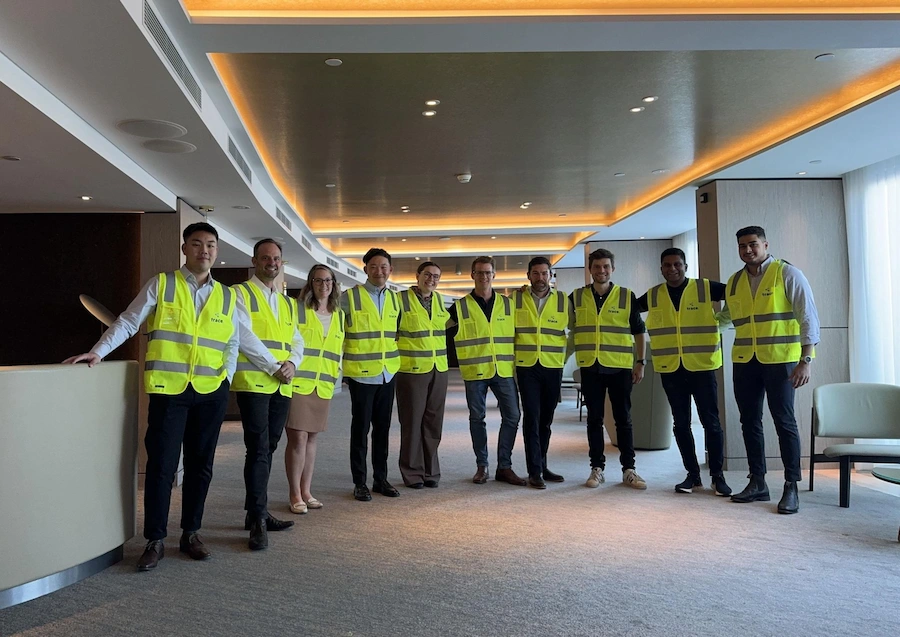Ready to turn insight into action?
We help organisations transform ideas into measurable results with strategies that work in the real world. Let’s talk about how we can solve your most complex supply chain challenges.

In today's business landscape, sustainability is no longer a choice but a necessity. Companies are increasingly held accountable for their environmental impact, and this responsibility extends beyond their direct operations. Scope 3 emissions, which encompass indirect emissions throughout a company's value chain, are a significant focus for regulators, investors, and consumers. This article explores Scope 3 emissions reporting requirements, how organisations can prepare to meet these requirements, and how Trace Consultants can support these efforts.

What Are Scope 3 Emissions?
Scope 3 emissions are part of the Greenhouse Gas (GHG) Protocol, a comprehensive global standard for measuring and managing greenhouse gas emissions. Emissions are categorised into three scopes:
- Scope 1: Direct emissions from owned or controlled sources.
- Scope 2: Indirect emissions from the generation of purchased electricity, steam, heating, and cooling.
- Scope 3: All other indirect emissions that occur in a company’s value chain.
Scope 3 emissions are often the largest part of a company's total emissions. They include emissions from purchased goods and services, business travel, employee commuting, waste disposal, use of sold products, transportation, and distribution, among others. The complexity and breadth of Scope 3 make it challenging to measure and report accurately.
The Importance of Scope 3 Emissions Reporting
Reporting Scope 3 emissions is crucial for several reasons:
- Regulatory Compliance: Increasingly, governments and regulatory bodies are mandating comprehensive emissions reporting. The European Union’s Corporate Sustainability Reporting Directive (CSRD) and other regional regulations require detailed emissions disclosures, including Scope 3.
- Investor Expectations: Investors are prioritising Environmental, Social, and Governance (ESG) criteria in their decision-making processes. Accurate Scope 3 reporting is essential for companies seeking investment.
- Consumer Demand: Consumers are more environmentally conscious and prefer to support sustainable businesses. Transparent reporting of Scope 3 emissions enhances brand reputation and customer loyalty.
- Risk Management: Understanding and managing Scope 3 emissions help companies identify potential risks in their supply chains and operations, leading to more resilient and sustainable business practices.
- Competitive Advantage: Companies that effectively manage and reduce their Scope 3 emissions can gain a competitive edge, positioning themselves as leaders in sustainability.
Scope 3 Emissions Reporting Requirements
Reporting Scope 3 emissions involves several steps and requires adherence to specific guidelines:
- Identify Relevant Scope 3 Categories: The GHG Protocol identifies 15 categories of Scope 3 emissions. Companies must determine which categories are relevant to their operations. This process involves analysing the company’s value chain and identifying where emissions are generated.
- Collect Data: Accurate data collection is critical. Companies need to gather information from suppliers, partners, and other value chain participants. This can be challenging due to the diverse and often fragmented nature of supply chains.
- Calculate Emissions: Once data is collected, companies must calculate their emissions using standardised methods. This may involve using emission factors, which are coefficients that quantify the emissions per unit of activity.
- Report and Disclose: Emissions data must be compiled into a comprehensive report. This report should be transparent, verifiable, and in line with recognised reporting frameworks such as the GHG Protocol, the Task Force on Climate-related Financial Disclosures (TCFD), or the CDP (formerly the Carbon Disclosure Project).
- Set Targets and Take Action: Reporting is not an end in itself. Companies should use the insights gained to set reduction targets and implement strategies to minimise their Scope 3 emissions.
Preparing for Scope 3 Emissions Reporting
Preparing for Scope 3 emissions reporting requires a strategic and systematic approach. Here are some steps organisations can take to be ready:
1. Develop a Comprehensive Strategy
Creating a robust strategy is the first step. This strategy should outline the company’s commitment to Scope 3 emissions reporting, define roles and responsibilities, and establish a timeline for implementation. Key elements include:
- Stakeholder Engagement: Involve key stakeholders, including suppliers, customers, and employees, to ensure their buy-in and cooperation.
- Resource Allocation: Allocate necessary resources, including budget, personnel, and technology, to support the reporting process.
- Policy and Governance: Develop policies and governance structures to oversee the reporting process and ensure compliance with relevant standards.
2. Conduct a Value Chain Assessment
Understanding the value chain is crucial for identifying Scope 3 emission sources. Conduct a thorough assessment to map out the company’s value chain and pinpoint areas where emissions occur. This assessment should include:
- Supplier Analysis: Evaluate suppliers’ emissions and sustainability practices. Prioritise those with significant emission contributions.
- Product Life Cycle Analysis: Assess the environmental impact of products throughout their life cycle, from raw material extraction to disposal.
- Logistics and Transportation Review: Analyse the emissions associated with transportation and distribution networks.
3. Enhance Data Collection and Management
Accurate data is the foundation of effective Scope 3 emissions reporting. Organisations should invest in robust data collection and management systems. Key actions include:
- Data Quality Control: Implement procedures to ensure the accuracy and reliability of data collected from various sources.
- Supplier Collaboration: Work closely with suppliers to gather necessary data. Provide them with guidance and tools to improve their emissions reporting.
- Technology Integration: Leverage technology solutions such as cloud-based platforms, IoT devices, and data analytics tools to streamline data collection and analysis.
4. Build Internal Capabilities
Building internal capabilities is essential for successful Scope 3 emissions reporting. This involves:
- Training and Education: Provide training to employees involved in the reporting process to ensure they understand the requirements and methodologies.
- Expertise Development: Develop or hire expertise in sustainability, environmental science, and data analytics.
- Cross-Functional Teams: Establish cross-functional teams to oversee different aspects of the reporting process, ensuring collaboration and integration across departments.
5. Implement Emission Reduction Strategies
Reporting is just the beginning. To truly make an impact, organisations must implement strategies to reduce their Scope 3 emissions. Effective strategies include:
- Supplier Engagement Programs: Collaborate with suppliers to improve their sustainability practices and reduce emissions.
- Product Innovation: Design and develop products with lower environmental impacts.
- Operational Efficiency: Optimise logistics, transportation, and waste management processes to minimise emissions.
- Circular Economy Initiatives: Promote recycling, reuse, and resource efficiency within the value chain.
How Trace Consultants Can Help
Navigating the complexities of Scope 3 emissions reporting and reduction can be daunting. This is where Trace Consultants comes in. As a leading supply chain consulting firm based in Australia, Trace Consultants specialises in helping organisations improve their sustainability performance. Here’s how Trace Consultants can assist:
1. Strategic Advisory Services
Trace Consultants provides strategic advisory services to help organisations develop comprehensive sustainability strategies. Their experts work closely with clients to understand their unique challenges and opportunities, creating tailored solutions that align with their goals.
2. Value Chain Analysis
Trace Consultants conducts in-depth value chain analyses to identify sources of Scope 3 emissions. Using advanced methodologies and tools, they map out the entire value chain, pinpointing areas where emissions are generated and where reduction efforts should be focused.
3. Data Collection and Management Solutions
Accurate data is essential for effective reporting. Trace Consultants offers robust data collection and management solutions, leveraging technology to streamline the process. Their experts ensure data accuracy and reliability, enabling organisations to report with confidence.
4. Training and Capability Building
Trace Consultants provides training and capability-building programs to equip organisations with the knowledge and skills needed for successful Scope 3 emissions reporting. Their training sessions cover reporting methodologies, data management, and emission reduction strategies.
5. Supplier Engagement Programs
Engaging suppliers is crucial for Scope 3 emissions reduction. Trace Consultants designs and implements supplier engagement programs, fostering collaboration and sustainability improvements across the value chain. They work with suppliers to enhance their reporting capabilities and reduce emissions.
6. Emission Reduction Strategies
Beyond reporting, Trace Consultants helps organisations implement effective emission reduction strategies. Their experts identify opportunities for operational efficiency, product innovation, and circular economy initiatives, driving meaningful reductions in Scope 3 emissions.
7. Reporting and Disclosure Support
Trace Consultants assists organisations in compiling comprehensive emissions reports that meet regulatory and stakeholder requirements. They ensure that reports are transparent, verifiable, and aligned with recognised frameworks, enhancing credibility and trust.
Scope 3 emissions reporting is a critical component of modern sustainability efforts. As regulatory, investor, and consumer pressures mount, organisations must take proactive steps to measure, report, and reduce their indirect emissions. By developing comprehensive strategies, conducting value chain assessments, enhancing data collection, building internal capabilities, and implementing reduction strategies, companies can navigate the complexities of Scope 3 emissions.
Trace Consultants, with their expertise and tailored solutions, are well-equipped to support organisations on this journey. By partnering with Trace Consultants, businesses can not only meet reporting requirements but also achieve significant sustainability improvements, positioning themselves as leaders in the transition to a low-carbon economy.
Ready to turn insight into action?
We help organisations transform ideas into measurable results with strategies that work in the real world. Let’s talk about how we can solve your most complex supply chain challenges.









